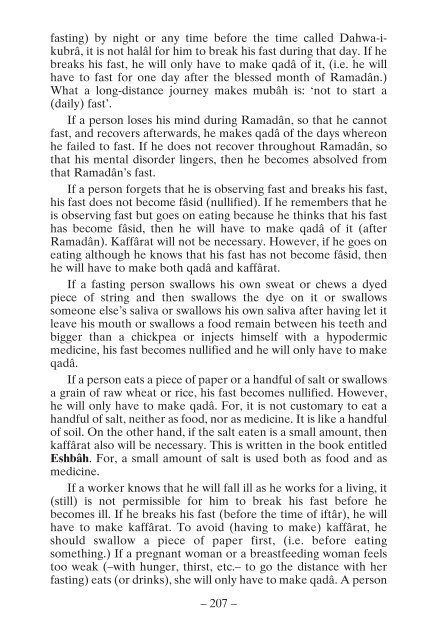Miftah-ul-Janna (Booklet for way to Paradise)
You also want an ePaper? Increase the reach of your titles
YUMPU automatically turns print PDFs into web optimized ePapers that Google loves.
fasting) by night or any time be<strong>for</strong>e the time called Dahwa-ikubrâ,<br />
it is not halâl <strong>for</strong> him <strong>to</strong> break his fast during that day. If he<br />
breaks his fast, he will only have <strong>to</strong> make qadâ of it, (i.e. he will<br />
have <strong>to</strong> fast <strong>for</strong> one day after the blessed month of Ramadân.)<br />
What a long-distance journey makes mubâh is: ‘not <strong>to</strong> start a<br />
(daily) fast’.<br />
If a person loses his mind during Ramadân, so that he cannot<br />
fast, and recovers afterwards, he makes qadâ of the days whereon<br />
he failed <strong>to</strong> fast. If he does not recover throughout Ramadân, so<br />
that his mental disorder lingers, then he becomes absolved from<br />
that Ramadân’s fast.<br />
If a person <strong>for</strong>gets that he is observing fast and breaks his fast,<br />
his fast does not become fâsid (n<strong>ul</strong>lified). If he remembers that he<br />
is observing fast but goes on eating because he thinks that his fast<br />
has become fâsid, then he will have <strong>to</strong> make qadâ of it (after<br />
Ramadân). Kaffârat will not be necessary. However, if he goes on<br />
eating although he knows that his fast has not become fâsid, then<br />
he will have <strong>to</strong> make both qadâ and kaffârat.<br />
If a fasting person swallows his own sweat or chews a dyed<br />
piece of string and then swallows the dye on it or swallows<br />
someone else’s saliva or swallows his own saliva after having let it<br />
leave his mouth or swallows a food remain between his teeth and<br />
bigger than a chickpea or injects himself with a hypodermic<br />
medicine, his fast becomes n<strong>ul</strong>lified and he will only have <strong>to</strong> make<br />
qadâ.<br />
If a person eats a piece of paper or a handf<strong>ul</strong> of salt or swallows<br />
a grain of raw wheat or rice, his fast becomes n<strong>ul</strong>lified. However,<br />
he will only have <strong>to</strong> make qadâ. For, it is not cus<strong>to</strong>mary <strong>to</strong> eat a<br />
handf<strong>ul</strong> of salt, neither as food, nor as medicine. It is like a handf<strong>ul</strong><br />
of soil. On the other hand, if the salt eaten is a small amount, then<br />
kaffârat also will be necessary. This is written in the book entitled<br />
Eshbâh. For, a small amount of salt is used both as food and as<br />
medicine.<br />
If a worker knows that he will fall ill as he works <strong>for</strong> a living, it<br />
(still) is not permissible <strong>for</strong> him <strong>to</strong> break his fast be<strong>for</strong>e he<br />
becomes ill. If he breaks his fast (be<strong>for</strong>e the time of iftâr), he will<br />
have <strong>to</strong> make kaffârat. To avoid (having <strong>to</strong> make) kaffârat, he<br />
sho<strong>ul</strong>d swallow a piece of paper first, (i.e. be<strong>for</strong>e eating<br />
something.) If a pregnant woman or a breastfeeding woman feels<br />
<strong>to</strong>o weak (–with hunger, thirst, etc.– <strong>to</strong> go the distance with her<br />
fasting) eats (or drinks), she will only have <strong>to</strong> make qadâ. A person<br />
– 207 –

















